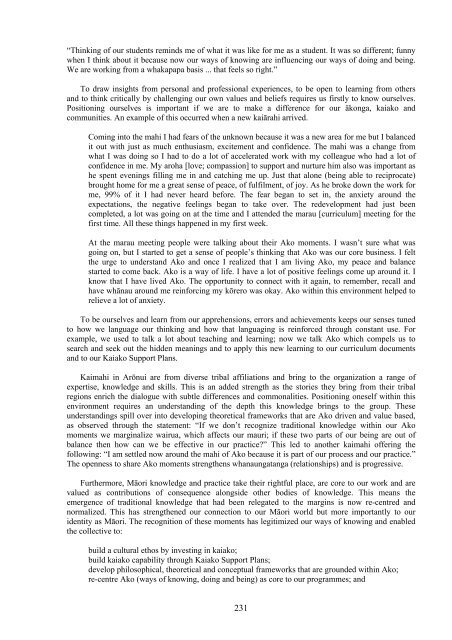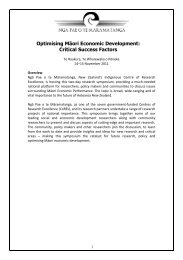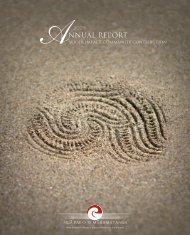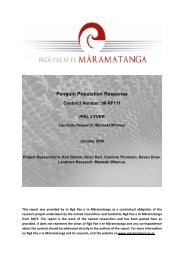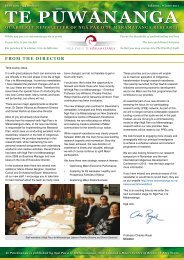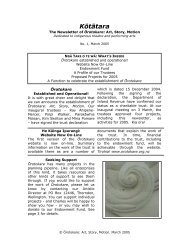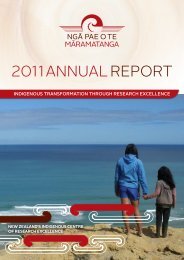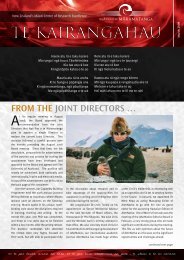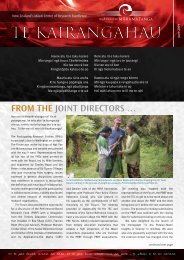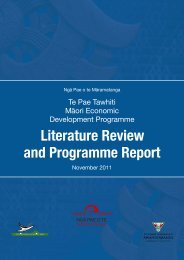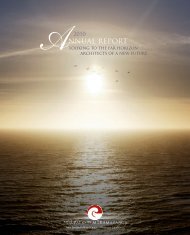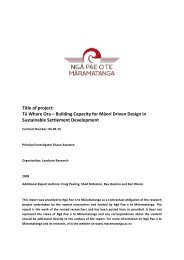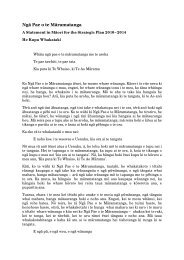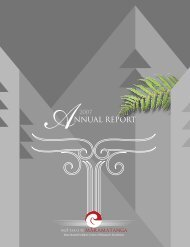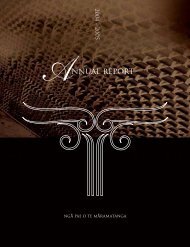traditional knowledge conference 2008 te tatau pounamu
traditional knowledge conference 2008 te tatau pounamu
traditional knowledge conference 2008 te tatau pounamu
Create successful ePaper yourself
Turn your PDF publications into a flip-book with our unique Google optimized e-Paper software.
“Thinking of our students reminds me of what it was like for me as a student. It was so different; funnywhen I think about it because now our ways of knowing are influencing our ways of doing and being.We are working from a whakapapa basis ... that feels so right.”To draw insights from personal and professional experiences, to be open to learning from othersand to think critically by challenging our own values and beliefs requires us firstly to know ourselves.Positioning ourselves is important if we are to make a difference for our ākonga, kaiako andcommunities. An example of this occurred when a new kaiārahi arrived.Coming into the mahi I had fears of the unknown because it was a new area for me but I balancedit out with just as much enthusiasm, exci<strong>te</strong>ment and confidence. The mahi was a change fromwhat I was doing so I had to do a lot of accelera<strong>te</strong>d work with my colleague who had a lot ofconfidence in me. My aroha [love; compassion] to support and nurture him also was important ashe spent evenings filling me in and catching me up. Just that alone (being able to reciproca<strong>te</strong>)brought home for me a great sense of peace, of fulfilment, of joy. As he broke down the work forme, 99% of it I had never heard before. The fear began to set in, the anxiety around theexpectations, the negative feelings began to take over. The redevelopment had just beencomple<strong>te</strong>d, a lot was going on at the time and I at<strong>te</strong>nded the marau [curriculum] meeting for thefirst time. All these things happened in my first week.At the marau meeting people were talking about their Ako moments. I wasn’t sure what wasgoing on, but I star<strong>te</strong>d to get a sense of people’s thinking that Ako was our core business. I feltthe urge to understand Ako and once I realized that I am living Ako, my peace and balancestar<strong>te</strong>d to come back. Ako is a way of life. I have a lot of positive feelings come up around it. Iknow that I have lived Ako. The opportunity to connect with it again, to remember, recall andhave whānau around me reinforcing my kōrero was okay. Ako within this environment helped torelieve a lot of anxiety.To be ourselves and learn from our apprehensions, errors and achievements keeps our senses tunedto how we language our thinking and how that languaging is reinforced through constant use. Forexample, we used to talk a lot about <strong>te</strong>aching and learning; now we talk Ako which compels us tosearch and seek out the hidden meanings and to apply this new learning to our curriculum documentsand to our Kaiako Support Plans.Kaimahi in Arōnui are from diverse tribal affiliations and bring to the organization a range ofexpertise, <strong>knowledge</strong> and skills. This is an added strength as the stories they bring from their tribalregions enrich the dialogue with subtle differences and commonalities. Positioning oneself within thisenvironment requires an understanding of the depth this <strong>knowledge</strong> brings to the group. Theseunderstandings spill over into developing theoretical frameworks that are Ako driven and value based,as observed through the sta<strong>te</strong>ment: “If we don’t recognize <strong>traditional</strong> <strong>knowledge</strong> within our Akomoments we marginalize wairua, which affects our mauri; if these two parts of our being are out ofbalance then how can we be effective in our practice?” This led to another kaimahi offering thefollowing: “I am settled now around the mahi of Ako because it is part of our process and our practice.”The openness to share Ako moments strengthens whanaungatanga (relationships) and is progressive.Furthermore, Māori <strong>knowledge</strong> and practice take their rightful place, are core to our work and arevalued as contributions of consequence alongside other bodies of <strong>knowledge</strong>. This means theemergence of <strong>traditional</strong> <strong>knowledge</strong> that had been relega<strong>te</strong>d to the margins is now re-centred andnormalized. This has strengthened our connection to our Māori world but more importantly to ouridentity as Māori. The recognition of these moments has legitimized our ways of knowing and enabledthe collective to:build a cultural ethos by investing in kaiako;build kaiako capability through Kaiako Support Plans;develop philosophical, theoretical and conceptual frameworks that are grounded within Ako;re-centre Ako (ways of knowing, doing and being) as core to our programmes; and231


